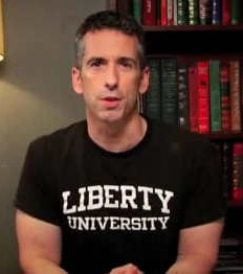Columnist Dan Savage has a message for “liberal Christians”:
In this video, Savage says:
Sometimes I forget to qualify “Christian” with “fundamentalist evangelical right-wing bats–t Christian.” And I’ll write something taking “Christians” to task for their abuse of queer people. And I’ll get emails and I’ll get calls from liberal Christians, whispering in my ear, “We’re not all like that. Psst, we’re not all like that.” I call them NALTs now, for Not All Like That Christians. NALT Christians.
When possible, I try to avoid that kind of phrase — “We’re not all like that,” or “Yes, I’m a Christian, but not that kind of Christian.” I don’t like the idea of defining or identifying myself based on what I’m not — or based on what I’m against.
Plus that just seems like setting the bar way too low. There’s more to following Jesus than simply not being a right-wing batsh–t loudmouth or not abusing others. That’s a minimal threshold of human decency, not the pinnacle of discipleship.

Also, “I’m a Christian, but not that kind of Christian” seems like the sort of thing that has to be shown rather than just said. If I put myself in a situation in which it is unclear whether or not I am an abusive loudmouth, then it’s unlikely that I’ll be able to clarify things at that point just by asserting that I’m not.
Having said all of that, “Christian” remains a vast and immensely diverse category. There are some 2.3 billion Christians in this world and there’s a great deal that we do not all agree on. Belonging to a group that large and that diverse makes it inevitable that every Christian will, at some point, need to say “We’re not all like that” about something. We may need to say it in response to inaccurate stereotypes or to broad generalizations based on someone’s limited experience with only one particular kind of Christian.
If I meet someone whose only idea of Christianity comes from seeing televangelists, it may be necessary to relieve their fears by reassuring them, “Don’t worry, we’re not all like that.” And if I meet someone whose only idea of Christianity comes from reading the Gospels or a biography of Martin Luther King Jr., it may be necessary to disappoint them by saying, “Alas, we’re not all like that.”
But there’s yet another context in which saying, “We’re not all like that” can be more than just a useful clarification. There’s a context in which Not All Like That can be a powerful tool for transformation.
When those words are said to others — to those standing outside of Christianity and looking in — then they seem at best merely practical and at worst disingenuous. But when those words are spoken within Christianity — by Christians addressing other Christians — they can be a source of hope, relief and liberation.
When spoken to other Christians, those words can be a revelation — the delightful news that there are choices, options and possibilities they may not have realized (or been allowed to realize) existed.
Dan Savage seems to understand this. He addresses his NALT Christian friends:
But the reason so many of us have the impression that you are all indeed like that, and why Christian has become synonymous with anti-gay, is because of these loud voices on the Christian right. And they’ve hijacked Christianity, with your complicit silence enabling their hijacking of it.
And you know what? Liberal Christians, you need to do something about it. You need to tell them you’re not all like that. We know — liberals, lefties, progressives, queers — we know that not all Christians are like that. The religious right: They don’t know. Tell them.
… If you’re a NALT, stand up for your beliefs, stand up for liberal Jesus. Start a dialogue with your chapels and churches. … Figure out ways you can make your place of worship, your church, a more welcoming and tolerant place.
So stop writing me and telling me that you’re Not All Like That, and start doing something about it. Start telling them you’re Not All Like That.












